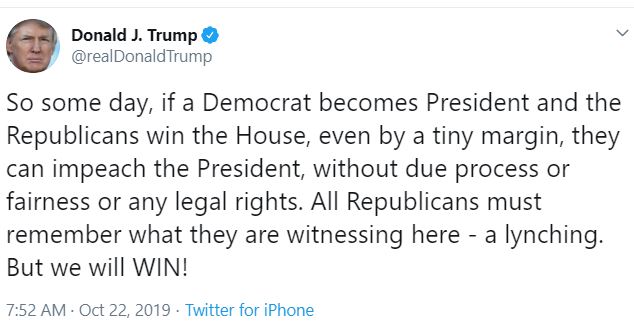 |
Sen. Cory Booker of New Jersey, a black Democrat currently seeking his party’s presidential nomination, said on Twitter, “Lynching is an act of terror used to uphold white supremacy. Try again.”
And the list of those who were horrified, sickened, and outraged by the president’s “lynching” comment--and Lindsey Graham’s head-nodding and Jim Jordan’s dismissal--goes on and on. And it should.
My own reaction when I heard the president was to consider drawing a picture of the president, in a white hood, holding a rope with a noose around the Constitution. But then the coffee and reason kicked in, and I realized that it would probably be a very, very bad idea for a cartoon.
To be clear though, I, like many of my generation, grew up with the words “lynching” or “lynched” bandied about with either glee or snarls by certain members of our communities (my community at the time was northern Louisiana, not far from the scene of multiple crimes involving whippings, shootings, bombings, and lynchings).
The very word lynching brings an ache to my heart and a troubling vibration in my brain—a vertigo caused by the locked file cabinets of my memories being pried open by Trump and Graham and seeing, once again, the terrible photographs and graphic news stories of white-on-black atrocities spilling out.
Trump used that awful word less than a week after the death of Representative Elijah Cummings—a sharecropper’s son who rose from poverty and dedicated his life and congressional standing to heal and help the nation rise above the ever-present brutalities of racism in America.
What troubles me even more than the president’s use of the word lynching is the continued spinelessness of the men and women of the Republican party in the United States Senate—the “deliberative” body—of Congress. What in god’s name can a sad, sick, bitter, uneducated, dangerous failure of a human being like the president have that he can hold it over the heads of his party’s members and cow them all into silence?
Is the need to be re-elected so great, so personally empowering, such a Faustian bargain that not one Senator of leadership standing can say out loud, “This is wrong!”? I worked on the Hill for 14 years—in the House and the Senate, and I saw weakness in many offices, but I saw a lot of courage, too. That, clearly, was a time now lost in the coal-black mists of another age. Shame does not describe the feelings the silent lambs of Capitol Hill should be feeling. Shame is not enough.
As my always more thoughtful wife suggested, what is needed now are loudspeakers positioned in every corner of the Capitol building, and in the Congressional office buildings, and from those speakers, at maximum volume, should come the words of songwriters Jack Antonoff and singer/songwriter Sara Bareilles, from “Brave”:
“Innocence, your history of silenceWon't do you any goodDid you think it would?
Let your words be anything but emptyWhy don't you tell them the truth?Say what you wanna sayAnd let the words fall out
Honestly I wanna see you be braveWith what you want to sayAnd let the words fall outHonestly I wanna see you be brave”
Be especially brave when you hear the word lynching…be brave and rid us of our foul-mouthed national nightmare.
No comments:
Post a Comment